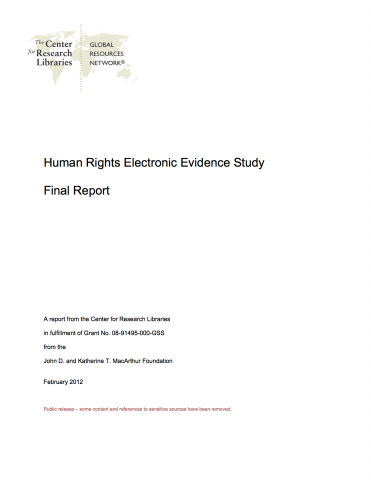
In 2008, the Center for Research Libraries (CRL) was awarded funding from the John D. and Catherine T. MacArthur Foundation to examine the practices and technologies used by human rights monitoring groups to create and collect documentary evidence in electronic form, and to assess the adequacy of that documentation for supporting advocacy, investigation, reporting, and legal proceedings at the domestic and international levels.
The explosion of communication technologies and the emergence of social media in the early 2000s offered activists and advocates unprecedented opportunities for creating and distributing evidence of human rights abuse. CRL is a major repository of human rights documentation from the pre-digital era: it holds files from the notorious Khmer Rouge regime in Cambodia, vast documentation of apartheid in South Africa, and transcripts of the secret military tribunals held in Brazil in the1960s and 70s. The implications of the long-term use and storage of digital materials led CRL to propose the assessment of international and regional organizations’ use of electronic documentation and to create a set of recommendations for libraries, archives, and HROs to manage these assets.
The study stemmed in part from the 2007 conference sponsored by CRL , the University of Texas Libraries, and the Center for Human Rights Documentation and Research (CHRDR) at Columbia University, "Human Rights Archives and Documentation: Meeting the Needs of Research, Teaching, Advocacy and Social Justice."
In addition to the final report, the project commissioned two studies relating to requirements for electronic documentary evidence used in legal processes. Admissibility of Electronic Documentation as Evidence in U.S. Courts focuses on the uses of various types of electronic evidence by organizations involved in the judicial process or extrajudicial proceedings in the United States. The second report, New Wine in Old Wineskins? New Problems in the Use of Electronic Evidence in Human Rights Investigations and Prosecutions, describes the legal issues that the use of electronic evidence in the international and national courts have raised and how those issues have been resolved.